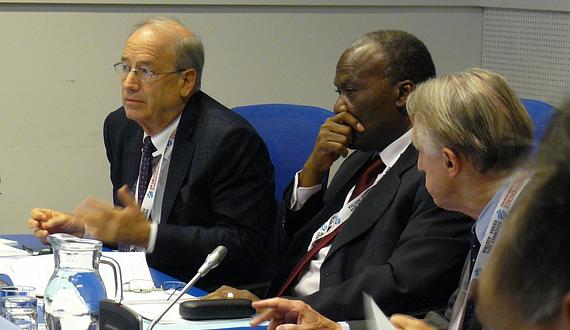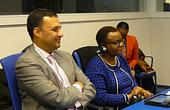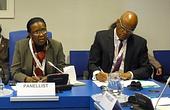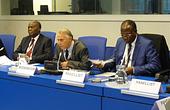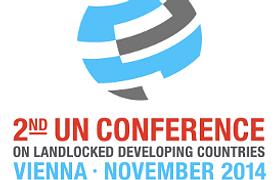
International Trade Center (ITC) and the Ferdi have organized a side event on "Aid for Trade and Regional Integration as Means for Accelerating Development of LLDCs" during the 2nd UN Conference on LLDCs which was held in Vienna from 3 to 5 November. This event took place November 4 (8.15 - 9.45) at Vienna International Centre (Room M6)
The event has gathered authors from the recent book AFT and experts from ITC, WTO and UNIDO, as well as representatives from LLDCs and United Nations. It was moderated by Professor Guillaumont, president of FERDI.
Note :
Landlocked developing countries (LLDCs) face many obstacles delaying the expansion of their trade. While the Aid for Trade (AFT) initiative has been successful at mobilizing resources, and the DTISs (Diagnostic Trade Integration Studies), carried out under the EIF (Enhanced Integrated Framework), have both helped Least Developed Countries integrate the world economy, much still remains to be done, in particular a more effective application of the principles of results-based management, and a greater connectivity with local and global value chains. This session has discussed the benefits that can be expected from such improvements including via exploiting the returns to successful regional integration and business support services to facilitate trade, which has been neglected so far and are the highest for LLDCs because of the complementarities across countries along many dimensions (resource-rich and resource-poor, landlocked and coastal, large and small). The side-event has also discussed how AFT-fuelled DTISs designed at the region level will help build the needed coordination across countries and related capacities in this field.
Upload the summary :
Agenda
Introductory remarks: The economic vulnerability and the need for regional integration in LLDCs by Patrick Guillaumont, President of Ferdi
power point presentation by Patrick Guillaumont
Keynote remarks on Aid for Trade, a crucial tool for LLDCs by Professor Jaime de Melo, Scientific Director, Ferdi, from his recent book “Aid for Trade – What have we learnt? Which way ahead?”
power point presentation by Jaime de Melo
Views from LLDCs:
- Valentine Rugwabiza, Minister of East African Community
- Hachim Koumare, Ministre de l’Equipement, des Transports et du Désenclavement, Mali
- Saley Saidou, Ministre des Transports, Niger
Views from International Institutions:
- Dorothy Tembo, Deputy Executive Director, ITC
- Steve Kayizzi-Mugerwa, Acting Vice–President and Chief Economist, AfDB
- Bernardo Calzadilla-Sarmiento, Director Trade Capacity Building Branch, UNIDO : "UNIDO's support to Aid for trade"
- Raul Torres, Counsellor, Development Division, WTO : "WTO and accelerating LLDC development through trade capacity building"
Keynote remarks by Gyan Acharya: UN Under-Secretary-General and High Representative for the Least Developed Countries, Landlocked Developing Countries and Small Island Developing States, United Nations
Exchanges with the floor
Simultaneous translation into English and French will be provided
The website of the 2nd UN Conference on LLDCs : http://www.lldc2conference.org/
Also link to the blog : "ITC to help implement UN’s new Vienna Programme of Action for Landlocked Developing Countries"
Les pays enclavés font face à de multiples obstacles qui retardent l’expansion de leurs échanges. Alors que l’initiative Aid for Trade (AfT) a permis la mobilisation de ressources et que les études diagnostiques sur l'intégration du commerce (EDIC), sous le Cadre intégré renforcé (CIR), ont aidé les pays les moins avancés à s'insérer dans l'économie mondiale, beaucoup reste à faire, en particulier une plus grande efficacité dans l’application des principes de la gestion basée sur les résultats et une plus grande connexion entre les chaînes de valeurs globales et locales. Cette session a discuté des bénéfices attendus de telles améliorations, notamment à partir des enseignements que l’on peut tirer du succès de l’intégration régionale et des services de soutien aux entreprises pour faciliter le commerce, trop longtemps négligés. Les plus importants concernent les pays enclavés en raison des nombreuses complémentarités entre pays (riches et pauvres en ressources, enclavés et côtiers, petits et grands). Ce side-event a également discuté de la façon dont les études diagnostiques sur l'intégration du commerce, alimentées par l’aide au commerce et déterminées au niveau régional, peuvent aider à assurer la coordination entre pays et promouvoir les capacités nécessaires à cette fin.
Remarques introductives : La vulnérabilité économique et le besoin d’intégration régionale dans les pays enclavés par Patrick Guillaumont, président de la Ferdi.
Keynote sur l’aide au commerce, un outil essentiel pour les pays enclavés, par Jaime de Melo, directeur scientifique à la Ferdi, à partir du son ouvrage récent “Aid for Trade – What have we learnt? Which way ahead?”
Points de vue de pays enclavés :
- Valentine Rugwabiza, Ministre de la Communauté Afrique de l'Est
- Hachim Koumare, Ministre de l’Equipement, des Transports et du Désenclavement, Mali
- Saley Saidou, Ministre des Transports, Niger : "Éléments d'échange sur l'Aide pour le commerce"
Points de vue des institutions internationales :
- Dorothy Tembo, Directrice exécutive adjointe, ITC
- Steve Kayizzi-Mugerwa, Economiste en Chef et Vice-Président par intérim, BAD
- Bernardo Calzadilla-Sarmiento, Directeur de l'Unité renforcement des capacités commerciales de l'ONUDI : "le soutien de l'ONUDI à l'initiative Aide au commerce"
- Raul Torres, Conseiller à la Division du développement de l'OMC : "WTO and accelerating LLDC development through trade capacity building"
Keynote par Gyan Acharya: Secrétaire général adjoint et Haut-Représentant pour les PMA, les pays en développement sans littoral et les petits États insulaires en développement, Nations Unies
Echanges avec le public
Conclusion


